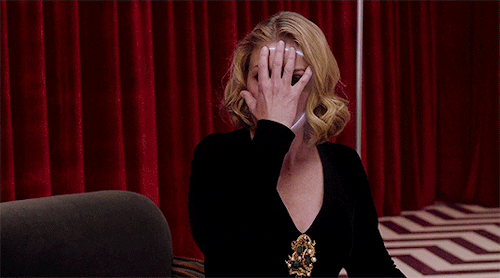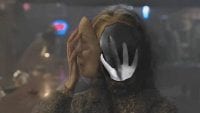Part 16 saw a lot of awakenings. Diane awoke. Audrey awoke. Cooper awoke. And, I think, the fandom awoke, as well, especially to the startling truth that Mr. C — who, after all, is part of our darling Agent Cooper — raped Diane in her home and that he fathered Richard, probably as a result of an assault on a comatose Audrey.
 It’s everything that I and many others said back in June when Diane first confronted Mr. C in the federal prison in Yankton. At the time we had very little to go on, and much of what we were saying was conjecture. But as subsequent Parts have rolled out and the little mysteries have been chipped away and their answers revealed, it’s become clearer and clearer that our early hunches have almost always proved right.
It’s everything that I and many others said back in June when Diane first confronted Mr. C in the federal prison in Yankton. At the time we had very little to go on, and much of what we were saying was conjecture. But as subsequent Parts have rolled out and the little mysteries have been chipped away and their answers revealed, it’s become clearer and clearer that our early hunches have almost always proved right.
The most amazing thing about The Return isn’t that it’s so molasses-slow and meandering and audacious in its storytelling that it may have just revolutionized the way TV is created and consumed, or that even when spoilers are released about an upcoming Part they still don’t reveal anything about said upcoming Part (although both of those things are entirely true). What has been slowly and surely revealing itself to us is that we’ve been given the answers all along if we knew where and how to look.
We know that Lynch likes dreamscapes. We know that these dreamscapes tend to include logic that defies logic (call it dream logic or Lodge logic — Lodgeic?). Specifically within The Return, we know that the first introduction to a character is almost always subverted. And now, I think it’s fair to say that Lynch/Frost have been far clearer in giving us these answers than we ever thought possible.
We were shown that something was off with Sarah from the get-go, and in Part 14 we saw that “off-ness” in action at the bar. We were shown that something was up with Jeffries in Part 2, and in Parts 15/16 we saw that come to fruition. We were shown Diane’s duplicitousness, and now have confirmation that she is, in fact, not herself and is working for Mr. C. We were shown the #3 plug and the #15 plug in the Mauve World, and this has correlated perfectly to the Part numbers where Cooper was going to exit (and probably fail) and where he needed to exit (to survive). We were even shown the method of his return: electricity, via a standard wall socket.
There were always multiple ways of examining these scenes, but they haven’t yet gone as deep and dark as some people wanted them to, or believed they should (Sarah probably isn’t the newest incarnation of BOB; Jeffries doesn’t seem to be an evil entity on par with BOB or Mother; Diane isn’t a doppelgänger like Mr. C; Cooper was, in fact, going to wake up). Do we want to overcomplicate the story because we think that’s what Lynchian means? I’m not sure, but I suspect this might be part of it.
On the flip side, there have always been people who take a very literal approach to the stories they’re being shown. To this group, Audrey had to have been simply living a life of disappointment with a spineless husband, a sad and delusional shell of her former vibrant self 1. Neither approach is wrong, per se, but at some point we were forced to stop conceptualizing our way out of what was staring us in the face, whether we were making it more or less difficult to understand.
It’s just a fact that there have been remarkably few red herrings in The Return. Apparently, it’s a fish that neither Lynch nor Frost particularly care for, just like Agent Cooper.
So it was that we came to understand what had happened to Audrey. We were told that Mr. C visiting Audrey in her hospital room while she was recovering from the bank explosion. We had broad hints that Richard Horne was her son, and that he was also linked to the evils of the Lodge. In order for those things to be true, Mr. C and Audrey to have had sexual intercourse (and in this case, it’s inescapable that this was non-consensual), and she had to have become pregnant as a result. Both of those things were proved to be true over the course of Parts 15 and 16. The red herring answer, arrived at by a lot of mental gymnastics, had Mr. C visiting Annie in the hospital, not Audrey — why? To get the ring? To check up on her? To kill her? Red herring connoisseurs insisted that Audrey was thrown in to keep us off the scent of the real story, and even as the answers became clearer and clearer week by week, there were still many who refused to believe it, and mocked those who did.
The same can be said of Diane. In Part 7 we were shown Diane reacting viscerally to Mr. C in the prison because of something that happened the last night they saw one another. Logic dictated that we should view this as trauma stemming from an assault; we were told as much in Part 162. The red herring answer was that something else happened — anything that had her not being assaulted in her home, but mostly revolving around unrequited love for Cooper — and in spite of all the evidence to the contrary present in that scene, there were still people disbelieving (and openly mocking) the notion that this could be true, right up until Sunday night.3
When you stop to really look at it, The Return has been remarkably explicit in many ways about the things that it shows us and why. Audrey’s story and that of the Roadhouse (as Scott Prendergast and I did last week) never matched up to the stories around it; something wasn’t right, and it felt like if you could just learn to speak the language, it would be plainly obvious what was going on. Charlie had a crystal ball in spite of his protestations to the contrary; the hourglass on his desk didn’t obey the laws of physics; Audrey seemed incapable of leaving her house. The Roadhouse, in its own way, was intimately connected to Audrey, as well, in a way we still don’t have clear answers for, but which seem to involve some kind of Wizard of Oz recasting of various role in the real world as characters in a dream world. Part 16 proved these once-upon-a-time ridiculous theories true, as we watched the Roadhouse flash out of existence as Audrey apparently woke up, not in the house we saw her in with Charlie, and not wearing the hair and makeup style of a 1940s pinup, but in a blindingly white room in front of a cosmetic mirror, stripped of everything we associate with her, and left to question the visage staring back at her as electricity crackled through our speakers.4
“What?! Wha.. What?!!”. – Audrey Horne #TwinPeaks #TheReturn @sherilynfenn1 pic.twitter.com/OJGqJyclcL
— Black Lodge Cult (@BlackLCult) August 28, 2017
Scott and I didn’t have to twist ourselves into knots to explain our theory that Audrey, like Cooper, needed to wake up. We just had to look at the clues we were given, employ a little inductive reasoning, make sure everything fit the established patterns we knew to be favourites of Lynch and Frost, and follow the trail to its natural conclusion. We, like Dale Cooper, trusted our intuition. This isn’t to say that The Return is overly simple but, rather, that it’s not overly complex. Neither is it a literal work which we’re expected to read on the surface. Like the proverbial bowls of porridge, it’s somewhere in between, and both over-simplifying and over-complicating things are anathema to understanding.
Using this framework, is it possible to answer some of the other questions we have about The Return? The Secret History of Twin Peaks primed us for ideas about multiple universes or parallel timelines; many people protested that this couldn’t possibly be the case, that the dossier was forged or that Mark Frost simply hadn’t done his homework. And yet we’ve seen evidence of time travel (Major Briggs), explicit mentions of alternate dimensions (The Zone), and collapsing/interfering timelines (the diner scene in Part 7; the new Bookhouse Boys arriving back at Jack Rabbit’s Palace in Part 14; the weirdness with Diane’s text messages; “Is it future or is it past?”). Can we be ready to accept this as a reality of The Return?
“How’s Annie?” you may ask. Well, she doesn’t seem to be an important part of the story at all, outside of her specific function as the catalyst behind the deus ex machina-esque diary pages. Moreover, we have Dougie being manufactured and Diane labelled a tulpa. I think we’re being told without being told that Annie is in the same boat. She’s non-exist-ent at this point, having served her function to the story. There’s no grand plot to protect her; it’s just that her existence was (retroactively) predicated on forgery, but a very specific type of forgery that enabled a larger story to be told around her. Can we be ready to accept this as a realty of The Return?
 And what about Laura? The abuse and murder victim whose presence haunted every frame of Twin Peaks hasn’t been seen since Part 2 when she told Cooper “I am dead…yet I live.” I believe we are being explicitly told that this is the case. Laura Palmer will return to us alive in some form. Perhaps she has been reincarnated; perhaps she will return as another lookalike Palmer cousin; perhaps, to borrow a term coined by my colleague, Laura Prime was manufactured like Dougie and Diane were, and the real Laura has also been trapped in the Lodge for decades, and she’s now ready to come out. I don’t have all the answers but I believe The Return has given us the blueprint to finding them out if we read the lines instead of looking so hard between them.
And what about Laura? The abuse and murder victim whose presence haunted every frame of Twin Peaks hasn’t been seen since Part 2 when she told Cooper “I am dead…yet I live.” I believe we are being explicitly told that this is the case. Laura Palmer will return to us alive in some form. Perhaps she has been reincarnated; perhaps she will return as another lookalike Palmer cousin; perhaps, to borrow a term coined by my colleague, Laura Prime was manufactured like Dougie and Diane were, and the real Laura has also been trapped in the Lodge for decades, and she’s now ready to come out. I don’t have all the answers but I believe The Return has given us the blueprint to finding them out if we read the lines instead of looking so hard between them.
1 A thick vein of spite seems to run through a lot of the social media discourse surrounding Audrey. I’m not sure where the open hostility from fans of Twin Peaks comes from — perhaps it’s backlash against one of the more popular, fan-fave characters. But it also seems to be tied to a kind of spite against Sherilyn Fenn herself, who famously spoke out against Showtime’s marketing strategy last October, presumably because she wasn’t included in it. Now we can see why she thought she might be — Audrey appears to have a tremendously central role here. Either way, it’s troubling that such hate has been directed at either her or her character. In both cases, Sherilyn/Audrey was vilified in typical nagging woman terms, which speaks to the inherent, internalised misogyny of her detractors (who see woman, real or fictional, complain about something and dismiss it as trivial without second thought.) This topic could be an essay unto itself, so I’ll rest my case here.
2 The desire to complicate things for the sake of crafting a more palatable story is an interesting one. Of course it’s a problem when complicating, say, Diane’s lived experience in order to explain away the truth of her assault; as I wrote at the time, that creates a vicious cycle of disbelief and victim blaming that is at the heart of present day rape culture, and which is but one of the social issues being highlighted by Lynch and Frost so masterfully in The Return. But my point here is that it is patently unnecessary to overcomplicate The Return with fanciful theories that stretch so far into the realm of the unexplainable that they become closer to fan fiction than actual solid theories. (Not that there’s anything wrong with fan fiction…)
3 It has struck me that a lot of the discussion around this show has been met with as a curious wave of anti-theorising as well. It’s strange that Twin Peaks in any form would inspire this, seeing as how the theorising is what has kept this show alive for 25 years, but nevertheless if you duck into any Twin Peaks discussion thread on social media, you’ll find examples of people shouting down other theories as dull or unimaginative or too fanciful and too grand (or even being told that theories are akin to spoilers and we should avoid all of that altogether). It’s…strange.
4 Is she in a hospital or is she in the Lodge? I’m going to continue following my gut to say that, because the music played by the band on stage is playing backwards over the credits immediately after her shocking appearance at the very end, she has been in a Lodge-state, and she’s been there for a long time. You can call it a coma (another theory widely mocked across the internet but which holds up in the face of this late evidence) or you can call it something it, but Audrey awoke from something; her “reality” seems no more real than a dream at this point.




